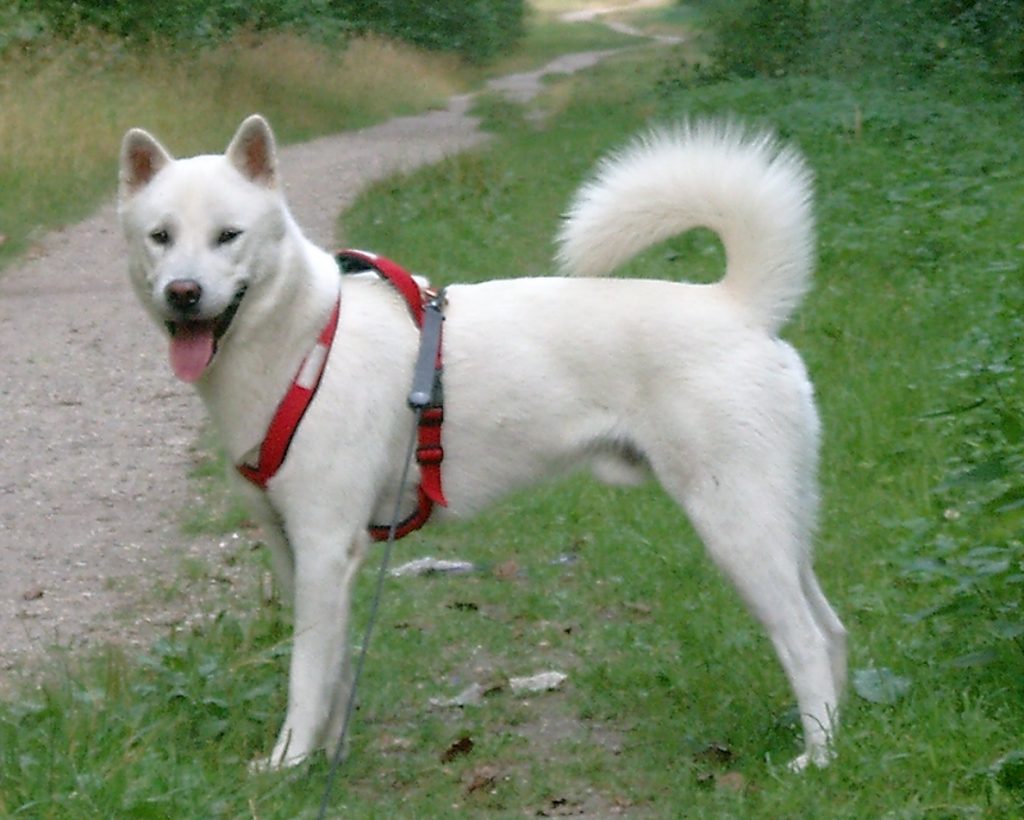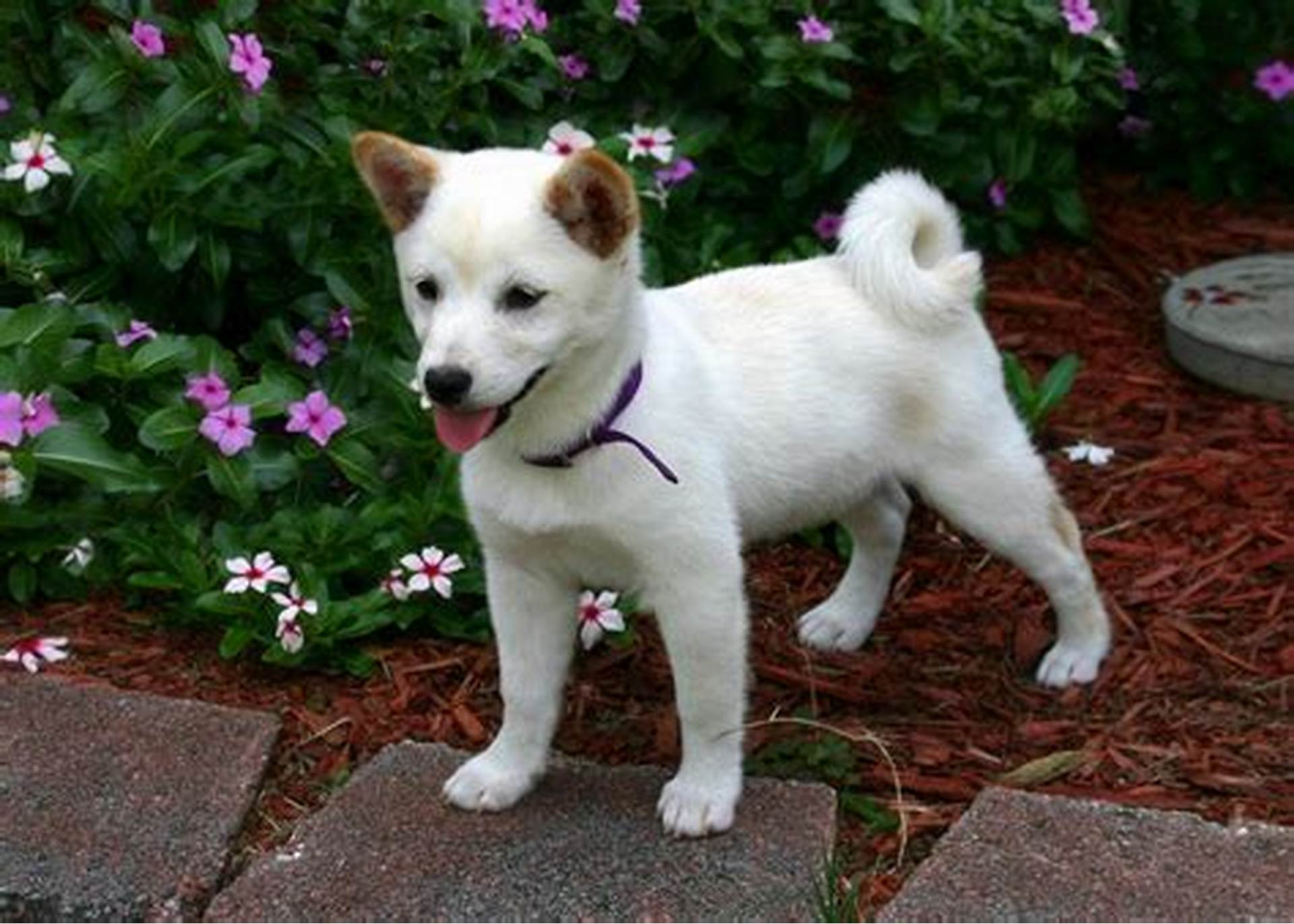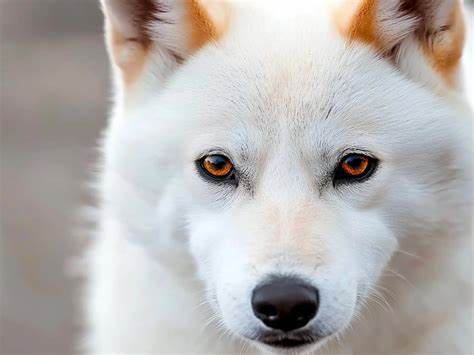
The Kishu Ken (or Kishu Inu) is one of Japan’s oldest and most treasured native dog breeds. Originating in the mountainous Kii Peninsula (now Wakayama and Mie Prefectures), the Kishu Ken was developed over centuries as a skilled hunter, particularly prized for tracking and silently hunting wild boar and deer.
The breed was standardized in the 1930s and designated a Natural Monument of Japan in 1934, solidifying its cultural importance. Originally found in a variety of coat colors, the breed was selectively bred over time to favor white coats, which now dominate the population for practical and aesthetic reasons.
Despite its noble heritage and stoic beauty, the Kishu Ken remains rare—even in its native country—and is considered a hidden gem among dog enthusiasts worldwide.
While not widely known outside of Japan, the Kishu Ken has a dedicated following of breed lovers who admire its loyalty, hunting prowess, and dignified demeanor. In Japan, it's respected as a symbol of purity and determination. In the U.S. and Europe, the breed has gained slow but steady interest among those who seek a quiet, intelligent, and emotionally intuitive companion.
Due to its rarity, prospective owners often join waitlists through specialty breeders and must demonstrate their understanding of the breed’s temperament.
The Kishu Ken presents a striking blend of wolf-like simplicity and elegant, athletic form. It is medium-sized, with a powerful yet refined build.
Coat: Short, straight, and dense double coat with a soft undercoat. Weather-resistant and low maintenance.
Color:
• Most common: white
• Also seen in red and sesame (a red coat with black-tipped hairs)
Size:
• Height: 17–22 inches (43–56 cm)
• Weight: 30–60 lbs (13–27 kg)
Head & Expression: Balanced and wedge-shaped with dark, expressive almond-shaped eyes and a black nose (or flesh-colored in whites).
Ears: Small, triangular, and firmly erect, angled slightly forward.
Tail: Thick and curled over the back or carried in a sickle shape.
Body: Strong, lean, and agile—built for endurance and stealth.
The Kishu Ken is known for its quiet confidence, loyalty, and calm nature. While reserved with strangers, it’s deeply devoted to its family.
Loyal and Reserved: Bonds closely with its family, often forming a deep connection with one person. Aloof with unfamiliar people and situations.
Silent Hunter: True to its origins, the Kishu tends not to bark excessively—even when alert.
Independent Yet Trainable: Intelligent and thoughtful, though sometimes slow to respond. Responds best to consistent, calm training with a respectful tone.
Emotionally Sensitive: Not a fan of chaos or harsh corrections—requires gentle, thoughtful handling.
Not Overtly Social: May be wary or uninterested in other dogs, particularly those of the same sex. Early and consistent socialization is important.

Ideal for calm, confident owners who appreciate a devoted companion with a quiet, noble personality.
Peaceful Presence: Unlike excitable or noisy breeds, the Kishu Ken brings a grounded calmness to the household.
Low-Maintenance Coat: Easy to groom with minimal odor or shedding most of the year.
Guardian-Like Loyalty: Strong protective instincts without unnecessary aggression or barking.
Unique and Rare: A meaningful choice for experienced owners seeking something truly different from common breeds.
Though low-maintenance physically, the Kishu Ken requires thoughtful handling, early socialization, and respectful training.
Training:
• Benefits from early, consistent socialization and trust-building exercises.
• Prefers a calm, respectful approach over force or repetition.
• Not a strong candidate for dog parks or chaotic environments.
Exercise:
• Moderate to high needs—daily walks and opportunities to run or explore are essential.
• Enjoys scent-based games and structured outdoor time.
Grooming:
• Weekly brushing, with heavier shedding twice a year.
• Rarely needs baths unless dirty—coat is naturally clean.
Nutrition:
• Thrives on a balanced, high-protein diet.
• Monitor weight, especially in less active individuals.
Companionship:
• Best in a stable home environment.
• Not ideal for owners seeking a social butterfly or attention-seeking dog.
• Doesn’t like being left alone for long stretches without purpose or stimulation.

The Kishu Ken is generally robust and long-lived, with a lifespan of 11–15 years. Breed-specific health issues are relatively rare, but can include:
• Allergies (environmental or food-related)
• Hypothyroidism
• Eye conditions (such as entropion)
• Autoimmune issues (rare)
Reputable breeders conduct health screenings and prioritize temperament and structural soundness.
The Kishu Ken is often compared to the Shiba Inu and Akita Inu but differs significantly in temperament. It is quieter and more devoted than the Shiba, and less dominant and intense than the Akita. Compared to Western breeds, its behavior resembles that of a primitive or spitz-type dog with strong loyalty and emotional sensitivity.
If you’re looking for a calm, elegant, and quietly affectionate companion who will bond deeply with you, the Kishu Ken may be a perfect match. It thrives in thoughtful, consistent homes with an appreciation for its quiet strength and independent nature.
Not recommended for first-time dog owners or households seeking a social, outgoing pet.
United Pet Club is ready to support you on your journey with the Kishu Ken. From rare-breed resources to training guidance and health advice, we’ll help you understand this noble Japanese breed and prepare for a long, meaningful relationship.